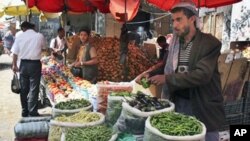Three years after the 2007-2008 global food crisis, food prices are rising again. Increasing demand for food in developing countries and weather-related production losses are the primary reasons for the increase in food prices. Fortunately, good harvests of staples in Africa and Latin America have kept local prices there low, and record world rice production has kept rice prices stable.
We are concerned about the impact that rising prices have on vulnerable people. We are watching food prices closely and working with the international community to respond appropriately to achieve long-term sustainable solutions to food insecurity.
"We know very well that hunger is a drain on economic development," said U.S. Secretary of State Hillary Clinton last October, as she accepted the World Food Programme's George McGovern Leadership Award for her commitment to ending global hunger. "Fighting hunger is a priority for us and it demands our highest levels of patience and commitment."
In response to the global food price spike in 2007-2008, President Obama pledged $3.5 billion to help poor countries fight hunger by investing in agricultural development. His Feed the Future Initiative utilizes innovation, research, and development to improve agricultural productivity, link farmers to local and regional markets, enhance nutrition, and build safety nets.
The international community also learned key lessons from the 2007-2008 food crisis on the importance of having the right policies in place. We are working bilaterally and within multilateral institutions, such as the UN food agencies, the G-20, and APEC, to encourage nations to pursue policies that facilitate agricultural growth and reliable trade flows.
We learned that it is vital to maintain transparent, functioning markets, and to avoid export barriers, panic buying and unnecessarily large increases in food stocks, as these actions tend to drive prices higher. Governments understandably need to ensure affordable food supplies. They can best do this through targeted safety nets for their most vulnerable and by reducing import tariffs and taxes.
As demand for food continues to increase in the long run, we need to increase productivity and improve markets. This requires conditions that foster investment in agriculture, particularly in the developing world, so innovative technologies can raise agricultural productivity.
Countries that make smart investments in agriculture will spur agricultural growth, ensuring that they are better able to combat hunger, feed their people, and contribute to stable global food supplies.
World Hunger On The Rise Again

We are concerned about the impact that rising prices have on vulnerable people.



